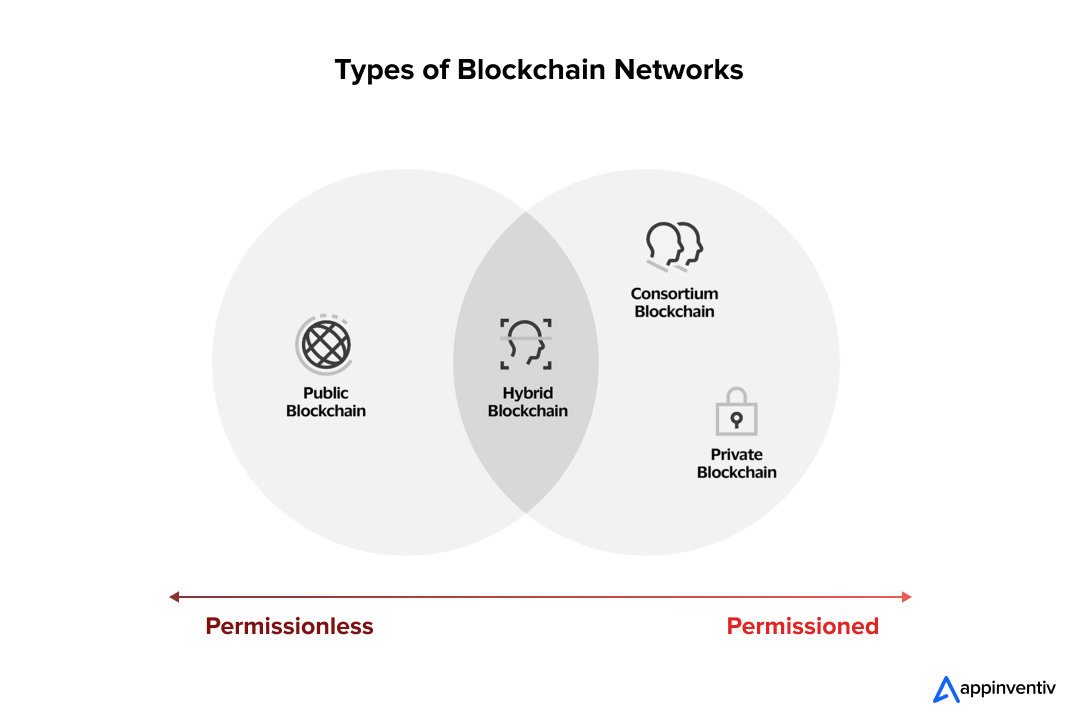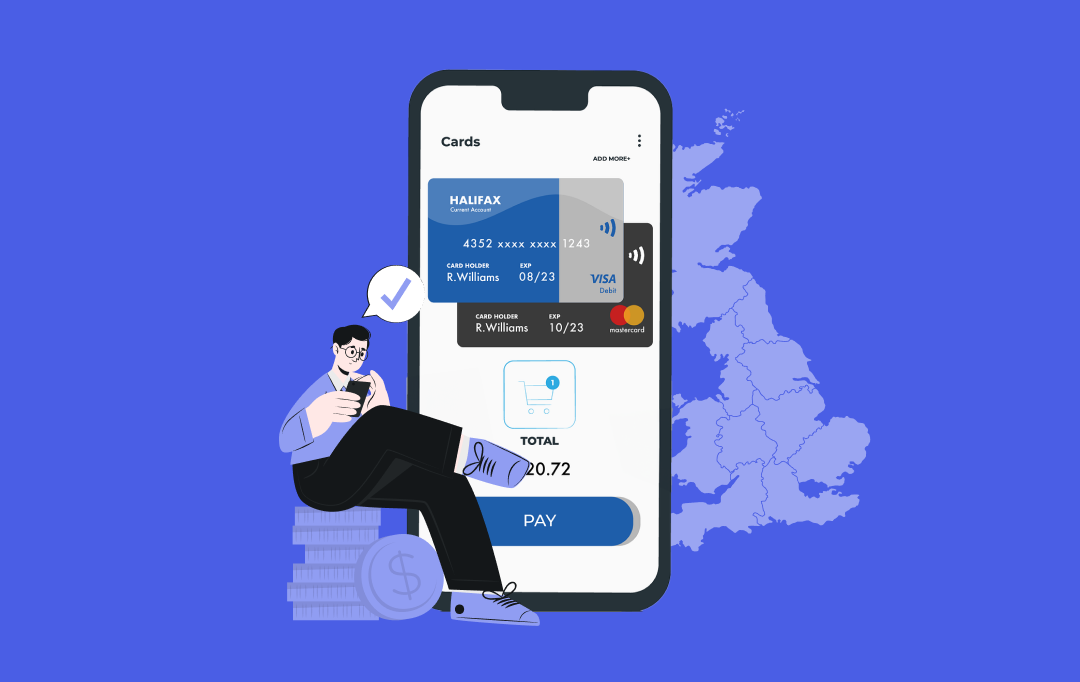- The Four Main Types of Blockchain Networks
- Public Blockchain
- Private Blockchain
- Consortium (Federated) Blockchain
- Hybrid Blockchain
- Enterprise Blockchain Features You Must Know
- 1. Decentralization
- 2. Immutability
- 3. Transparency
- 4. Smart Contracts
- 5. Interoperability
- 6. Consensus Mechanisms
- Requirements of a Good Blockchain Enterprise Solution
- Privacy
- Security
- Throughput Time
- Operational Cost
- Top Blockchain for Enterprise Platforms
- Ethereum
- Hyperledger Fabric
- Quorum
- Corda
- XDC Network
- Hyperledger Sawtooth
- Enterprise Use Cases for Blockchain
- Banking and Finance
- Insurance
- Education
- Automobiles
- Aviation
- Retail
- Supply Chain and Logistics
- Real Estate
- Healthcare
- Media & Entertainment
- Enterprise Blockchain Comparison: Choosing the Right Fit
- Challenges Posing as Roadblocks to Enterprise Blockchain Widespread Adoption and Solutions to Overcome
- Security and Scalability Issues
- Lack of Knowledge
- Problems with Reorientation
- FAQs
Blockchain is growing at an increasingly apparent rate as enterprises understand its numerous benefits, which range from improved supply chain operations to increased cybersecurity. The current transition from theoretical reflection to practical use reflects a broader trend in which enterprises actively incorporate blockchain into their fundamental operating processes rather than just viewing it as an innovative concept.
However, this surge in blockchain adoption is not without its complexities or challenges. The remarkable impact of blockchain, while evident, is navigating hurdles such as interoperability, scalability, and regulatory compliance. Despite facing challenges, the obvious impact of blockchain for enterprises is driving a notable shift from preliminary conceptual analysis to practical implementation.
As per Statista, the global blockchain technology market size is expected to reach a valuation of $163 billion by 2027. There are several reasons that are expected to fuel this market’s projected expansion. One important driver is the growing understanding of blockchain’s revolutionary potential in various industries, from supply chain and healthcare to banking and beyond.

The technology’s broad acceptance has been driven by its ability to improve security, transparency, and efficiency in various processes. Additionally, the market is anticipated to reach new heights due to the growing need for tamper-resistant and decentralized systems and ongoing improvements in blockchain applications.
In this blog, we will discuss the top features of enterprise blockchain, its benefits and requirements, platforms, use cases, and challenges around its adoption and implementation. Let’s get started!
The Four Main Types of Blockchain Networks
Blockchain networks come in various forms, each serving different purposes and offering unique advantages. Let’s take a quick look at those and understand how those work.

Public Blockchain
A public blockchain is open for anyone to join and participate, ensuring full decentralization and transparency. Multiple participants validate transactions through consensus mechanisms like Proof of Work or Proof of Stake. This type of blockchain is ideal for scenarios where trustless transactions are crucial. Examples include Bitcoin and Ethereum.
Private Blockchain
Private blockchains are restricted to authorized users or organizations and are controlled by a central entity. Only selected participants can access, validate, and alter data, providing better control and security. This model is typically used for internal purposes in enterprises, such as secure record-keeping or supply chain management.
Consortium (Federated) Blockchain
A consortium blockchain is managed by a group of organizations, offering a shared platform with more governance than a fully decentralized public blockchain. It balances privacy and transparency, making it ideal for collaborative industries where trust among a few parties is needed. Examples include cross-bank networks or healthcare data sharing.
Hybrid Blockchain
Hybrid blockchains combine elements of both public and private blockchains, enabling selective access to data while maintaining transparency where necessary. This flexible structure is perfect for cases requiring confidentiality and public validation, such as government projects or regulated industries.
Enterprise Blockchain Features You Must Know
Many blockchain use cases in the enterprise ecosystem are drawn because of its diverse features that fill the loopholes and gaps. Here are some of the top blockchain features that you must know.

1. Decentralization
In an enterprise setup, it is usually believed that everything from compliance to communication should be done through a centralized route. Your enterprise can create a tamper-proof system by incorporating a decentralized mechanism, known as the Blockchain of Things, in business communication networks and compliance. Availing blockchain solutions for custom enterprise software development services allows the business to operate in an unhackable system.
2. Immutability
The fact that blockchain operates on an immutability mechanism, making it impossible to change what once gets fed into the blocks, makes quality and correctness paramount.
In a traditional system, quality becomes a matter of multiple to and fro, which leads to not just a delay in the delivery time but also an end result that comes with no guarantee of the quality or even alignment with what was originally required.
But, when the enterprise works under the pressure of its data getting locked in the system, the probability of completeness of information and quality maintenance automatically increases.
3. Transparency
The fact that blockchain brings out everything in the open leads to injecting an entirely new wave into how responsibly the employees and stakeholders act in the business. The transparency functionality that blockchain offers is revamping the future of transactions.
Blockchain’s inherent transparency transforms the traditional business landscape by rendering every transaction immutable and traceable. This visibility fosters accountability among employees and stakeholders alike. Knowing their actions are permanently recorded encourages a heightened sense of responsibility, thereby minimizing the risk of fraudulent activities and unethical behavior.
Moreover, the transparent nature of blockchain instills confidence among stakeholders, as they can verify the authenticity of each transaction in real-time. The decentralized and distributed ledger system ensures that no single entity can manipulate or alter records, reinforcing the idea of shared responsibility.
4. Smart Contracts
Self-executing contracts with predefined terms and conditions are called smart contracts. These blockchain-based automated contracts have several noteworthy benefits. They promote efficiency and lower operating costs by streamlining procedures and eliminating the need for middlemen.
By automating processes, smart contracts reduce the possibility of errors and disputes while increasing transaction speed and accuracy. Their implementation fosters a smooth and open contractual environment by accelerating the entire contract lifecycle. Smart contracts are a ground-breaking development in contract administration, offering a decentralized, safe, and effective method of online agreements.
5. Interoperability
The interoperability feature in blockchain refers to a system’s ability to interact seamlessly with other blockchain networks and systems. This feature enables collaboration, information exchange, and effective communication between various systems and organizations. Interoperability enables blockchain networks and systems to function as a unit, which improves data interchange and resource use efficiency.
It plays a pivotal role in breaking down silos, allowing for a more collaborative and interconnected digital ecosystem. With interoperability, organizations can leverage the strengths of various platforms, ensuring a more streamlined approach to data sharing and communication across the digital landscape. This integration ultimately promotes a more scalable, efficient, and collaborative environment in the broader spectrum of blockchain applications.
6. Consensus Mechanisms
Blockchain consensus mechanisms are protocols that let nodes in the network decide whether a transaction is valid or not. These systems are essential for preserving the blockchain’s integrity because they guarantee each member has a consistent, reliable record of all transactions. Blockchain networks create a transparent and safe environment by preventing fraudulent activities like double-spending through consensus-building.
Consensus mechanism techniques are advantageous because they can establish a common reality among nodes, which improves the distributed ledger’s dependability and immutability. Diverse consensus algorithms, including Proof of Work (PoW) and Proof of Stake (PoS), provide distinct methods for reaching a consensus, meeting various blockchain networks’ unique requirements and objectives.
On that note, next, we are going to look at the requirements that make up a good, well-planned enterprise blockchain system.
Requirements of a Good Blockchain Enterprise Solution

Blockchain, when looked at in the public system versus when operating in an enterprise ecosystem, shows a completely different picture. The differences are not just in the face of the blockchain enterprise use cases but also in terms of the specifics that are demanded in terms of features or requirements.
Companies, when looking at adopting blockchain on a mass scale, get faced with challenges similar to enterprise AI adoption barriers that organizations must systematically address to ensure successful technology implementation.
For an enterprise blockchain solution, the expected requirements from the technology revolve around:
Privacy
In a public blockchain, the data is available for anyone to view. However, when implementing blockchain in the enterprise, the users who adhere to the rules and compliances that revolve around businesses can use data and information.
For use cases of blockchain technology to emerge, it is important that the mechanism followed is based on permissioned viewing. The technology, when operating in a business setup, should only allow access to the authorized stakeholders and not everyone in the company.
Security
Although closely related to privacy, the security functionality is also very different in the case of enterprise blockchain compared to the public blockchain system.
Elements like Know Your Customer or Anti Money Laundering, which are optional in a public blockchain system, become important when an enterprise’s security setup is compromised.
While blockchain comes with the promise of heightened security and a hack-proof system, it becomes almost mandatory to ensure that extra levels of security are added to your blockchain for business setup.
Throughput Time
Transaction volumes on blockchain systems differ significantly between public and permissioned setups. Public blockchains generally exhibit greater scalability, accommodating more transactions per second. Additionally, the higher number of nodes participating in a consensus protocol enhances scalability but can reduce throughput time.
But, since blockchain for enterprise works exactly the opposite of it, blockchain app developers are expected to keep the throughput time to an absolute low.
Operational Cost
For an enterprise, irrespective of what the revenue size is, saving operational costs is hands down one of the most important elements. Businesses prefer working around an operational cost that is not just low but also predictable. And so, it becomes an important side note that the blockchain enterprise application should work on a cost-effective platform that works on stable, predictable transaction fees.
The requirement set that we just discussed has created an influx of demand that the blockchain industry has abided by in offering private and permissioned blockchain platforms that are devised around these enterprise requirements and demands.
Here are the platforms that are most commonly considered for developing blockchain use cases by enterprise blockchain solution companies around the globe –
Top Blockchain for Enterprise Platforms
There has been an increase in the number of blockchain platforms as they continue to accelerate and support the development of blockchain-based applications. Here are a few enterprise blockchain platforms commonly used to develop innovative blockchain applications in business.

Ethereum
The platform works as the base component in the development of a majority of the decentralized applications operating in the market today, especially in the enterprise setup. The blockchain community users trust Ethereum because it offers many benefits, such as strong security, stable performance, no downtime, and effective fraud prevention.
Hyperledger Fabric
Hyperledger Fabric is a type of blockchain framework designed for businesses. It operates as a permissioned network, meaning that the users must be registered and granted specific permissions to participate. This registration process involves providing users with transaction authority and identity access.
Quorum
The Ethereum-based permissioned network supports both private and public forms of transactions. It is considered ideal for developing apps that demand quick processing and fast speed of private transactions of the blockchain ecosystem. Quorum, considered to be in an evolving stage, has become a part of the blockchain journey of several industries, which are not just restricted to simply offering decentralized finance products.
Corda
Corda is an open-source blockchain platform that ensures businesses to transact directly while ensuring strict privacy with smart contract integrations. The enterprises use the Corda platform to reduce record-keeping and transaction costs by streamlining diverse business processes. The agile platform scales up or down to meet real-time business requirements. Applications built on Corda allow you to create a specialized token that can handle enterprise-scale financial transactions.
It helps businesses accelerate time to market (TTM) and maximize return on investment by offering functionalities like the Byzantine Fault Tolerance consensus mechanism.
XDC Network
XDC network is a ready enterprise-grade hybrid blockchain for finance and global trading. It combines the features of private and public blockchain via cross-chain smart contracts. Enterprise blockchain solutions based on this platform offer features like decentralization and liquid network leveraging interoperability that powers digitalization and tokenization with instant regulation of trade transactions occurring on the platform.
The applications built on the XDC network are efficient as they minimize dependency on complicated FX infrastructures. It uses the Delegated Proof of Stake (XDPoS), leveraging the facility of stakeholder approval voting. Some known wallets that support XDC are Freewallet, XcelPay, BitFi Wallet, etc.
Hyperledger Sawtooth
Hyperledger Sawtooth is a well-known enterprise blockchain platform offering a modular and flexible blockchain enterprise architecture that separates the core system from the application domain. It helps enterprises create smart contracts that imply business rules for applications without understanding the underlying design of the core system. The Hyperledger Sawtooth understands consensus algorithms like Practical Byzantine Fault Tolerance (PBFT) and Proof of Elapse Time (PoET).
A few of the known features of Hyperledger Sawtooth are- parallel transaction execution, Ethereum contract compatibility with Seth, Pluggable consensus algorithms, and private networks with permission features.
The fact that blockchain’s features fit like a glove with the enterprise setup helps in building efficient business use cases for blockchain, and the rising number of platforms makes it possible to develop enterprise blockchain solutions. Altogether, it hints towards one thing – enterprises are no longer wondering if they should employ blockchain technology in their processes but are looking at the different ways of incorporation.
Although the use of blockchain in enterprise is becoming a necessity with the growing competition, you can still decide whether you really need blockchain in your business or not.

While it is not mandated to implement blockchain in your enterprise today, doing it would give you far greater plus points in how your processes flow and what overall image you create in the industry.
[Also read: 10 ways to embrace blockchain for business transformation]
To give you an idea of the present-day scenario, here are the industry-wise enterprise blockchain applications/use cases.
Enterprise Use Cases for Blockchain
Innovators and visionaries across different industries understand the advantages of blockchain technology. The blockchain for enterprise use cases are making its way into almost every industry vertical today. Below, we have shared a few real-world enterprise blockchain use cases by industry.

Banking and Finance
The symbiotic relationship between blockchain and the finance industry has deep historical roots, marking a revolutionary impact on FinTech. This evolution unfolds through meticulous pilot programs, comprehensive tests, and Proof of Concepts (POCs). Prominent financial giants, including RBC, Santander, JP Morgan, BNY Mellon, Citibank, Visa, American Express, Goldman Sachs, and MasterCard, are at the forefront of this journey.
These industry leaders are not merely engaged in blockchain initiatives; they have also established internal working groups dedicated solely to exploring and implementing enterprise blockchain technology. The expansive landscape of blockchain use cases in finance extends well beyond these pioneering efforts, encompassing a broad spectrum of applications.
Consider the example of JPMorgan Chase, a banking institution that has made big moves in adopting blockchain technology. It has been actively involved in blockchain initiatives. JPMorgan’s enterprise-focused Ethereum-based blockchain technology, Quorum, aims to power the Interbank Information Network (IIN), which shortens processing times to improve the effectiveness of cross-border payments.
Also Read- Why are Banks Adopting Blockchain Technology?
Insurance
Blockchain is key to transforming the insurance sector because it improves security, efficiency, and transparency across various activities. One prominent application of blockchain technology in real life is insurance claims processing. The insurance claims procedure typically involves several middlemen, which causes delays and raises the risk of fraud. Smart contracts can be utilized with blockchain technology to automate and expedite the claims settlement.
The risk of false claims is decreased at every stage- from submitting a claim to verification, and payment is tracked on a decentralized, tamper-resistant ledger. This improves stakeholder trust while also accelerating the settlement process. The application of blockchain technology in the insurance sector is a prime example of how the technology improves industry efficiency while lowering operational complexity.
For instance, one of the leading global insurance firms, Allianz, has explored blockchain technology to expedite the claims procedure. They have contributed to initiatives to improve insurance contract management and claims settlement efficiency and transparency.
Education
The use of blockchain in education ensures the integrity of educational records by offering a transparent and decentralized system for storing and authenticating academic credentials. It lowers the possibility of fraud by facilitating the safe and impenetrable issue of degrees and certificates. Employers and other organizations can expedite credential validation by leveraging smart contracts to support automated verification processes.
Furthermore, blockchain can empower students by granting them more control over their academic records and facilitating convenient, portable access to their credentials. This technology fosters trust in the education system, as information is immutable and resistant to manipulation.
The Massachusetts Institute of Technology (MIT) is one of the prime examples of blockchain in education use cases. This initiative gives graduates direct control over sharing their credentials, eliminating the risk of fraud and streamlining the verification procedures for both businesses and educational institutions.
Automobiles
Auto manufacturers have realized that the complete essence of the mobility industry is altering. Everything from autonomous vehicles to ride-sharing is changing the traditional mobility world.
In the face of all these changes, several automotive companies are planning to enter the blockchain world to participate in mobility reinvention programs.
BMW is an integral part of the Mobility Open Blockchain Initiative (MOBI), an organization that investigates the use of blockchain technology in the automotive sector. They look into use cases such as transparent supplier chains, vehicle identity, and safe, unhackable mileage tracking. This indicates the company’s dedication to using blockchain technology to improve the automotive business in several ways.
Aviation
Blockchain technology in aviation helps airlines maintain record security, manage aviation maintenance, streamline tokenized ticketing, and deliver a seamless digital travel experience. Record keeping in aviation is one of the key areas of utilization of blockchain technology. Airlines can minimize the possibility of discrepancy or manipulation by securing flight data, maintenance records, and other critical information on a blockchain. This ensures the integrity and security of these records.
In 2017, Airbus conducted a Proof of Concept with blockchain technology at Berkeley to track jet plane parts. In the same year, KLM started working with blockchain consultancy to help develop blockchain-specific prototypes.
Tokenized ticketing is yet another intriguing use of blockchain technology in aviation. Airlines can create digital assets representing a passenger’s right to a seat on a certain aircraft by tokenizing tickets on a blockchain. This creates new opportunities for loyalty programs and other customer incentives in addition to streamlining the ticketing process.
Blockchain technology is revolutionizing the airline sector by augmenting security, optimizing efficacy, and opening up new digital travel experiences for passengers. There will likely be more innovative blockchain uses in aviation in the future as the technology develops.
Retail
When it comes to blockchain, the retail industry is one of the most concentrated on the technology industries that are making retail more profitable. Ultimately, the industry gives a high scope to the technology to work around supply chain management. Blockchain technology offers an unchangeable and transparent ledger that traces the path of goods from manufacturing to delivery, which has the potential to transform supply chain management in the retail industry completely.
Retailers can verify suppliers’ ethical and sustainable practices, track the origin of items, and ensure product authenticity by implementing blockchain technology in supply chain management. Not only does this transparency contribute to the preservation of product quality, but it also fosters consumer trust. An example of blockchain use cases in the retail industry can be seen in the case of Walmart – the brand that is trialing the usage of blockchain for tracking the origin and movement of pork in China.
Alibaba uses an in-house-based private blockchain network to track the product’s authenticity in the supply chain and reduce the number of counterfeit goods entering the system. The company also uses blockchain to simplify cross-border transactions and provide customers with accurate product data. Another use case is Amazon, which uses blockchain technology to offer a track-and-trace feature that gives sellers better visibility of the items in the inventory and their current location.
Supply Chain and Logistics
Blockchain-based applications in supply chain and logistics can greatly improve management by enabling faster and more cost-efficient delivery of products, traceability, coordination between partners, and access to financing. Blockchain uses DLT (distributed ledger technology), which benefits the supply chain and logistics industry by recording the motions of each shipping container in real time, eliminating unnecessary steps in delivery, and reducing bottlenecks and human errors with smart contracts.
As a major participant in the logistics sector, FedEx is actively utilizing blockchain technology through its participation in the Blockchain in Transport Alliance (BiTA). With this strategic collaboration, FedEx is committed to improving supply chain visibility and transparency.
The application of blockchain technology has the potential to completely transform the logistics industry by offering a decentralized, safe platform for tracking goods. This system provides a strong framework for minimizing errors and maximizing overall logistics efficiency, going beyond simple tracking.
Real Estate
Blockchain is increasingly becoming a preferred method for investors, sellers, and buyers in the real estate sector to connect and explore property opportunities. The distributed ledger technology in blockchain-based real estate applications increases trust through greater transparency and expedites contract processes while saving time and money.
Prologis, a well-known real estate investment firm, has explored blockchain technology in an effort to streamline real estate transactions. Prologis, by utilizing blockchain technology, simplifies the complex procedures involved in purchasing and selling real estate assets by utilizing blockchain.
Blockchain technology facilitates the development of a safe, transparent ownership record. This makes transactions easier to handle while enhancing security and trust, opening up the possibilities for more reliable and successful real estate transactions.
Healthcare
Blockchain in healthcare has shown promising results for the last few years. Implementing a blockchain-based solution helps identify challenges and improves the overall performance, security, and transparency in sharing medical data in the industry.
Blockchain in healthcare has many uses, such as supply chain transparency, maintaining and accessing patients’ EHRs, smart contracts for insurance and supply chain, medical staff credential verification, and IoT blockchain use cases for monitoring remote devices.
One of the biggest names in pharmaceuticals, Pfizer, has been actively exploring blockchain technology to protect the integrity of its supply chain. Pfizer aims to improve pharmaceutical product traceability and transparency by utilizing blockchain technology as it moves through the complex supply chain. The pharmaceutical sector is about to undergo a revolution owing to the strategic deployment of blockchain technology, which offers a safe and unchangeable record of each product’s journey.
Media & Entertainment
Blockchain use cases in the media and entertainment industry are continuously evolving. Currently, the media industry uses blockchain to disseminate royalty payments for movies, music, and streaming services. The blockchain use cases in media and entertainment are also facilitating the new business models that allow the industry to meet the changing demands of consumers and deliver them to encourage usage-based payments.
Comcast, a significant participant in the media sector, has actively engaged in and embraced blockchain-based initiatives. The company is investigating how blockchain technology might be used in several important media-related industries. This covers digital rights management, content distribution, and general media supply chain optimization.
Comcast, by leveraging blockchain, transformed how media material is delivered, safeguarded, and managed by introducing increased efficiency, transparency, and security in these crucial areas by utilizing the inherent benefits of blockchain technology.
So, these were some of the best blockchain use cases in enterprises that are prevalent today. Now, let us delve into the other side of the coin – the challenges surrounding blockchain’s widespread adoption and the innovative solutions poised to overcome them.
Enterprise Blockchain Comparison: Choosing the Right Fit
As blockchain technology gains traction in the enterprise space, selecting the right platform is critical for scalability, security, and business fit. Different platforms offer distinct advantages depending on the industry, use case, and level of decentralization required. Below is a comparison of some of the leading blockchain platforms for enterprise use:
| Platform | Type | Consensus Mechanism | Permissioned | Best Suited For |
|---|---|---|---|---|
| Hyperledger Fabric | Private / Consortium | Pluggable (e.g., Raft, Kafka) | Yes | Supply chain, finance, healthcare |
| Ethereum (Enterprise) | Public / Private | Proof of Stake (PoS) | Optional | Tokenization, smart contracts, DeFi |
| Corda | Private / Consortium | Notary-based | Yes | Financial services, legal, healthcare |
| Quorum | Private | Istanbul BFT, Raft | Yes | Finance, asset management |
| Polkadot | Public | Nominated Proof of Stake (NPoS) | No | Cross-chain communication, interoperability |
| Ripple | Private / Consortium | Ripple Protocol Consensus Algo | Yes | Cross-border payments |
Challenges Posing as Roadblocks to Enterprise Blockchain Widespread Adoption and Solutions to Overcome
Companies, when looking at adopting blockchain on a mass scale, get faced with a number of challenges and internal barriers that keep them from delving deeper into the technology. Here’s what companies feel are the barriers to blockchain mass adoption in enterprises and the solutions to overcome those.

Security and Scalability Issues
Several strong blockchain systems are plagued by compromised security and scalability expectations. Businesses encounter challenges in identifying solutions that meet their unique security and scalability needs.
Solution: Work with leading enterprise blockchain development firms to create specialized solutions. Expert collaboration in resolving scalability and security concerns guarantees that the blockchain platform will smoothly conform to the business’s unique needs.
Lack of Knowledge
A significant challenge businesses encounter is the shortage of experts with a profound understanding of blockchain technology, who can effectively manage and deploy blockchain systems.
Solution: Invest in talent acquisition and skill development efforts to help close the knowledge gap and guarantee efficient blockchain system implementation and management by fostering a pool of qualified people.
Problems with Reorientation
Transitioning from conventional business models to blockchain necessitates a substantial reorientation. Stakeholders may resist this shift, leading to a slower pace of widespread blockchain adoption in enterprises.
Solution: Stakeholders can showcase effective pilot projects and adopt a gradual changeover strategy. The organization’s success stories and gradual implementation of blockchain technology help to ease the reorientation process, win over stakeholders, and enable a more seamless transfer to blockchain technology.

How Can Appinventiv Help You with Enterprise Blockchain Development?
The increasing prevalence of blockchain enterprise use cases is a testament to its potential. As more businesses embrace this technology, its impact is expected to multiply in the future. Embracing blockchain solutions positions enterprises to capture market opportunities more effectively and provides a substantial competitive edge.
Building and implementing an enterprise blockchain solution is a complex undertaking that requires expert help. At Appinventiv, we bring extensive experience in blockchain application development. Our proficiency allows us to establish a blockchain enterprise ecosystem that decentralizes core business processes, thus contributing to the growth and innovation of your business.
With the help of our blockchain development services, many startups and SMEs have scaled their business operations. We have worked with multiple brands like Empire App, and Nova to transform their industry space with efficient solutions. We also worked with top global clientele like KFC, Pizza Hut, IKEA, Adidas, Domino’s, and others, helping them expand their user reach in various global regions.
Leverage the transformative power of blockchain for enterprises. Contact us today to build blockchain solutions, propelling your business to new heights.
FAQs
Q. What are the different enterprise blockchain platforms?
A. An enterprise blockchain platform enables the development of permissioned or permissionless blockchain applications. The different enterprise blockchain platforms are Ethereum, Hyperledger Fabric, Hyperledger Sawtooth, Ripple, Quorum, XDC, R3 Corda, Tezos, etc.
Q. What is the checklist you must follow before hiring an enterprise blockchain company?
A. It is recommended to hire a blockchain development company with a pool of blockchain developers, i.e., the team must have in-depth domain knowledge. Here’s a checklist you must follow:
- Knowledge of crypto-economic protocols
- Agile development model
- Blockchain-based portfolio
- Team size
- Ratings, reviews, and testimonials
Q. Why should you invest in enterprise blockchain development?
A. Blockchain for enterprise application development offers various benefits that help in an organization’s growth. A few reasons to go for enterprise blockchain development include:
- Efficiency through automation
- Enhanced security
- Transparency and accountability
- Decentralization
- Immutability
- Interoperability
- Streamlined auditing and compliance
- Cost savings
- Increased trust in the supply chain


- In just 2 mins you will get a response
- Your idea is 100% protected by our Non Disclosure Agreement.

Step-by-Step Guide to Crypto Trading Bot Development in 2026
Key takeaways: Crypto trading bot development in 2026 functions as full-scale trading systems, not experimental scripts. They require the same engineering discipline as any financial platform. Execution quality drives results more than strategy logic. Latency control, order handling, and risk limits shape real-world performance. AI-based strategies work only when supported by reliable data flows, controlled…

Decentralized Exchange (DEX) Development: Features, Implementation Cost, and Enterprise ROI
Key Takeaways The development of a decentralized exchange will enable businesses to provide secure and user-controlled trading, improve transparency, and minimize the use of intermediaries. The cost of DEX development can vary depending on the platform's features, the chosen network, and regulatory requirements, and the approximate cost is about $50,000, with higher costs for customization,…

Key takeaways: Dubai's VARA framework mandates strict compliance protocols for blockchain enterprises. To comply with VARA in Dubai, enterprise blockchain systems should use private networks that only approved members can join. Choosing between Hyperledger Fabric, private Ethereum, Corda platforms, etc., significantly impacts long-term scalability, compliance automation, and maintenance costs. Enterprises implementing VARA enterprise blockchain development…





































